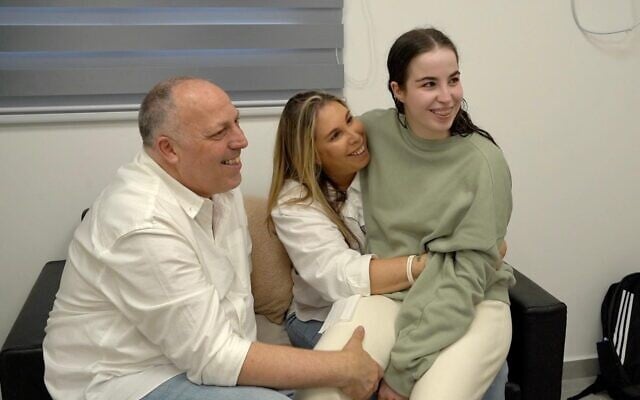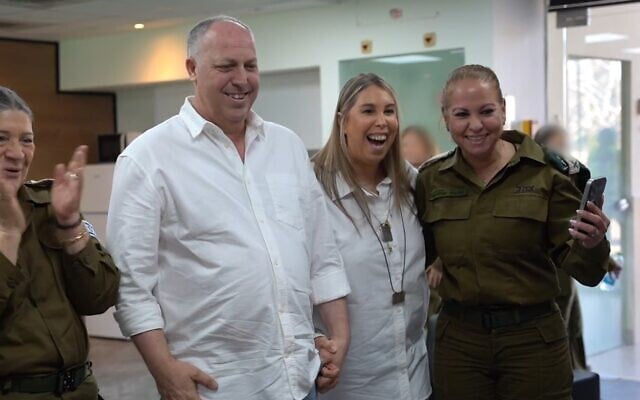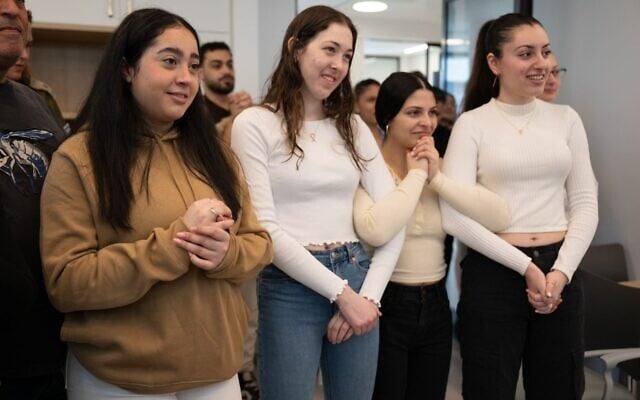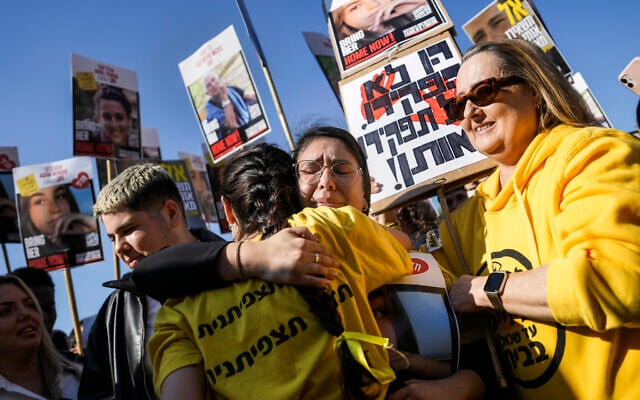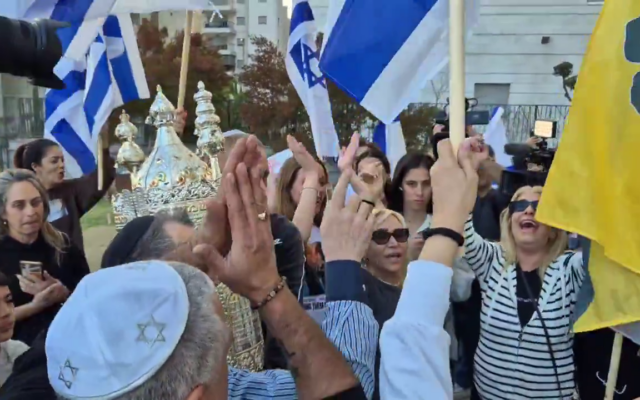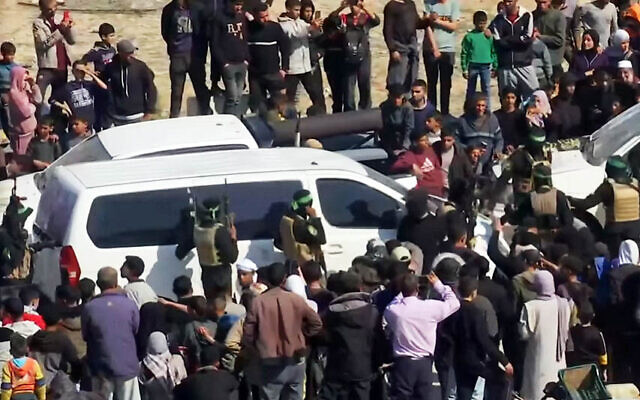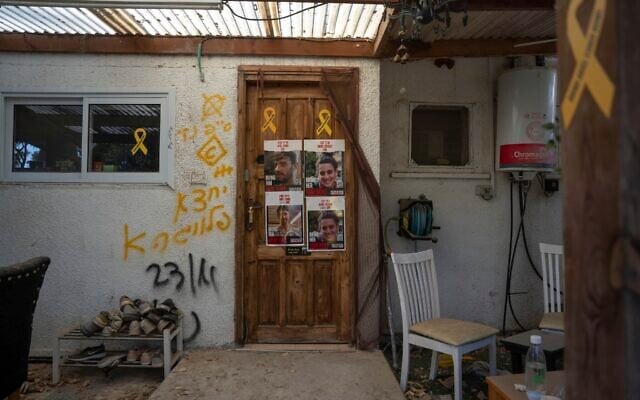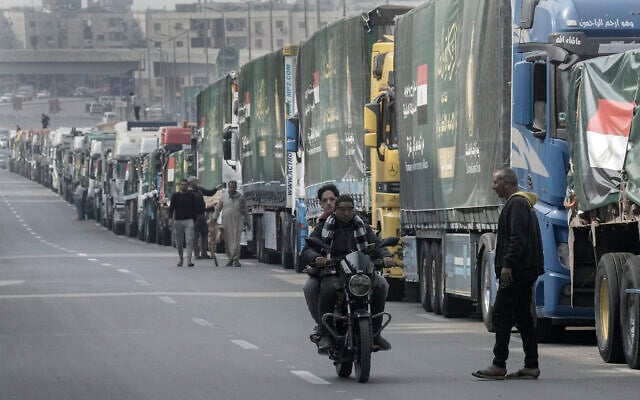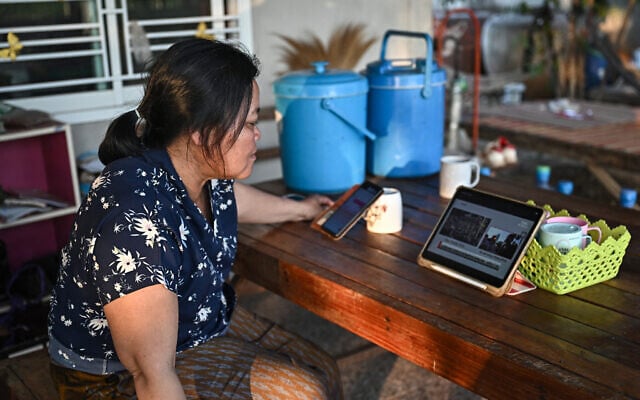


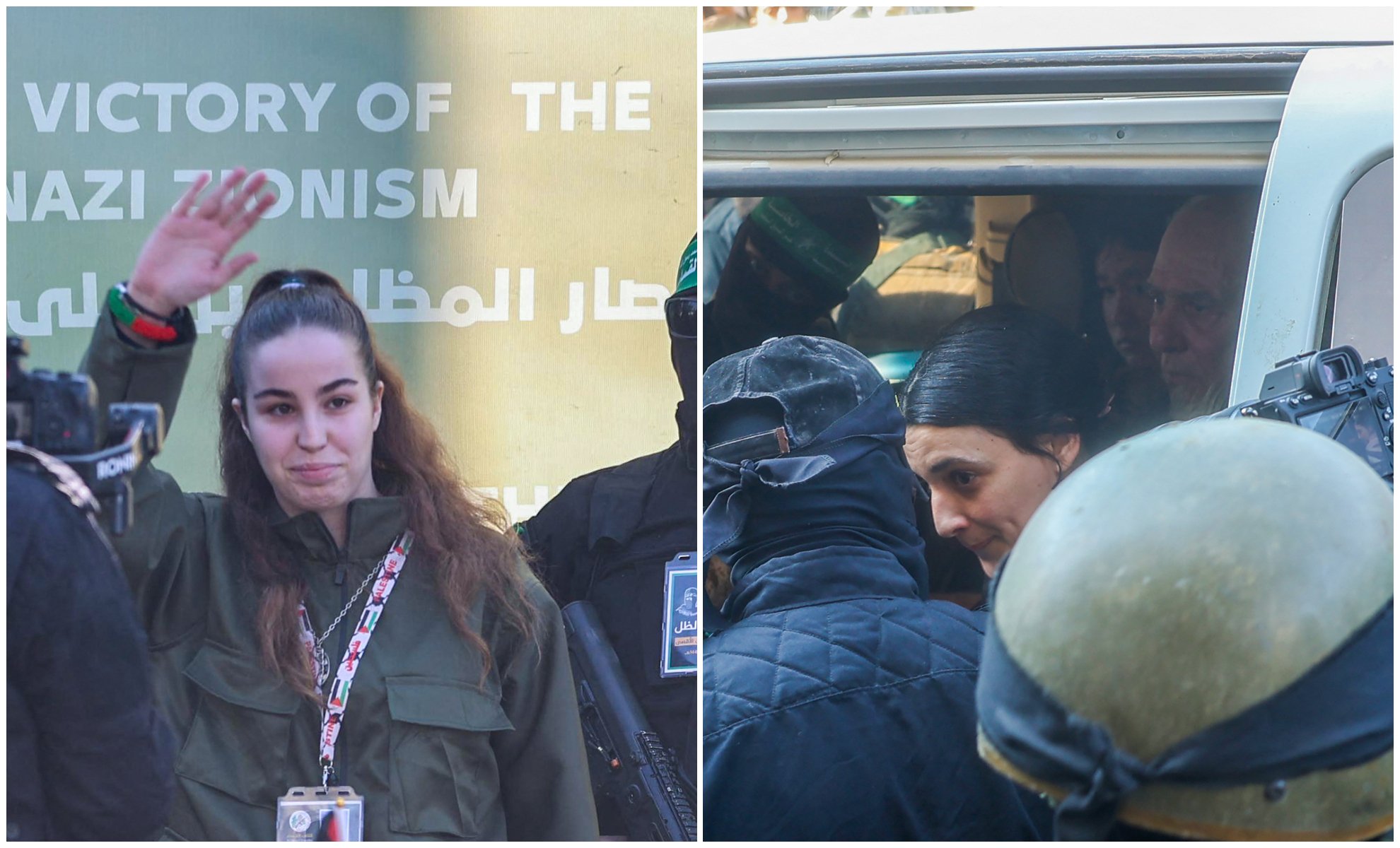
Eight more hostages taken during the October 7, 2023, attack on Israel — Israelis Agam Berger, 20, Arbel Yehoud, 29, and Gadi Mozes, 80, and five Thai nationals — were released by Palestinian terror groups on Thursday under an ongoing ceasefire deal with Hamas, returning to Israel after 482 days in captivity in Gaza.
Berger and the Thai hostages were held by the Hamas terror group, while Yehoud and Mozes were held by Palestinian Islamic Jihad.
Berger, an Israel Defense Forces surveillance soldier, was abducted from the military’s Nahal Oz base, while Yehoud and Mozes were both taken from their homes in Kibbutz Nir Oz.
The Thai hostages, who have not yet been named, were among 31 foreign nationals kidnapped in the Hamas attack who were working in Israel, many of them as farmhands in Israel’s agricultural heartland near the Gaza border.
Previously, seven hostages — four soldiers and three civilians, all women — have been released in two batches since the accord with Hamas came into effect last Sunday. Berger was kidnapped along with the four other soldiers and held together with them by Hamas until they were released on Saturday.
She was released on Thursday morning in northern Gaza’s Jabalia, at a ceremony similar to the one her comrades had to endure five days ago, surrounded by masked Hamas gunmen.
She too was dressed in olive garb meant to look like an IDF uniform and given a Hamas “gift bag” and framed certificate. She waved to the crowd of Gazans gathered in front of the stage before being led by armed men to the Red Cross representatives.
Prior to her release, Red Cross representatives were seen on the stage signing documents.
The Red Cross transported the freed hostage soldier to IDF and Shin Bet forces inside Gaza, after which she was escorted out of the Strip to a military facility near the border to reunite with her parents and undergo initial assessments by doctors and mental health officers.
She emerged from a Red Cross vehicle at the IDF facility no longer wearing the fake military uniform she was forced by Hamas to don for the handover. Video released by the military showed her embracing an IDF medical officer before getting into another vehicle to exit the Strip.
The IDF also released images of Berger reuniting with her parents, Shlomi and Merav, at the military facility.
From there, she was helicoptered along with her parents to the Rabin Medical Center in Petah Tikva.
Shortly after her release, Berger’s family released a statement thanking security forces and the public for their support.
“We want to thank the security forces and all the people of Israel for their support and prayers. Now Agam and our family can begin the healing process,” the family said in a statement after the IDF announced that Berger had been reunited with her family.
Berger, from central Israel’s Holon, had arrived at the Nahal Oz base just two days before the October 7 onslaught. She only had time that morning to call her father, Shlomi, and tell him she was under fire.
She was identified later that day in a Hamas Telegram video, in which she was seen being led to a car, still dressed in her pajamas.
Berger is one of seven female soldiers who were abducted from the base.
One of the abducted surveillance soldiers, Ori Megidish, was later rescued alive, and the body of a second one, Noa Marciano, was recovered after she was murdered in captivity.
The other four soldiers — Karina Ariev, Daniella Gilboa, Naama Levy, and Liri Albag — have requested to stay in the hospital for a few more days to be with Berger as she begins her recovery.
The four reportedly told friends and relatives that it was very hard to leave Berger behind in captivity and at least one of them asked to be allowed to remain with Berger rather than be released.
The young women watched on Thursday morning as their friend and comrade was released from Hamas captivity.
Dr. Lena Koren Feldman, director of Rabin Medical Center, said that when the four former hostages saw Berger being released, “there were screams of joy and great excitement.”
“Her return marks an essential step in their collective healing,” Feldman said.
Berger is slated to be brought to the same hospital where the four soldiers are being treated, Rabin Medical Center, to be reunited.
At Tel Aviv’s so-called Hostages Square, hundreds of people gathered ahead of the releases on Thursday morning, cheering as they watched live footage of Berger’s release on a big screen.
Many in the crowd wore braids in their hair as a tribute to Berger, who braided the hair of fellow female hostages, including children released during a weeklong truce with Hamas in November 2023.
Family members and friends also gathered at Berger’s home in Holon to celebrate her return to Israel, cheering, rejoicing and singing as images showed her being released by Hamas.
Many of the happy family members waved Israeli flags, and danced with a Torah scroll brought into the home.
“This is the happiest moment of my life,” one of the relatives told Channel 12 news. “Now we can breathe again.”
“She is a hero,” said another, as images show her being paraded on the stage in Jabalia. “She is on her feet walking.”
Yehoud and Mozes, along with the five Thai hostages, were released at an uncontrolled, chaotic and dangerous handover in southern Gaza’s Khan Younis early Thursday afternoon, outside the destroyed home of slain Hamas leader Yahya Sinwar, surrounded by hundreds of masked gunmen and large crowds.
The seven arrived in a large convoy that moved slowly through the crowds, with dozens of armed and masked gunmen riding on the back of the trucks. Other vehicles bore heavy machine guns. Many waved Hamas and Islamic Jihad flags in the air.
They were transferred to the Red Cross in southern Gaza’s Khan Younis, led through a raucous crowd of surging Palestinians holding cameras to film the spectacle, surrounded by masked gunmen.
Channel 12 news reported that Israel was in contact with the hostage-ceasefire deal mediators during the tense handover to complain about the terrifying and inhumane conditions to which the abductees were being subjected.
Earlier on Thursday morning, PIJ issued a propaganda video showing Yehoud and Mozes, both kidnapped from Nir Oz on October 7, embracing ahead of their release. It was unclear when exactly the video was filmed.
Al Jazeera reported that the reunion was the first time Yehoud saw a fellow hostage since she was kidnapped over 15 months ago.
Mozes’s partner, Efrat Katz, was killed during the October 7 onslaught, apparently by IDF fire. Her daughter Doron Katz-Asher was kidnapped along with her granddaughters Raz, then aged 5, and Aviv, then 2. The surviving three were released in a hostage deal in November 2023.
On Wednesday, the Mozes family said it had “received with great excitement the wonderful news of our beloved Gadi’s return.”
Yehoud was kidnapped from Nir Oz along with her partner Ariel Cunio, who is still held hostage in Gaza. She grew up on the Gaza-adjacent kibbutz, where her family has been living for three generations.
She was initially supposed to be released in last weekend’s exchange, as she is a civilian, but Hamas instead released the four surveillance soldiers.
Her fate was briefly a major sticking point in the deal’s implementation, with Israel blocking the return of Palestinians to northern Gaza on Sunday. Under the ceasefire and hostage release deal, the terror group was required to prioritize the release of civilian women.
The extra batch of hostages released Thursday — in addition to three others who are set to go free on Saturday — was added to the schedule after a dispute over Hamas’s failure to release Yehoud in the previous group was resolved early Monday.
But Hamas accused Israel on Wednesday of jeopardizing the deal by holding up aid deliveries, an allegation Israel promptly dismissed as “fake news.”
The truce deal has allowed truckloads of aid into Gaza, where the war has created a long-running humanitarian crisis.
COGAT, the Israeli Defense Ministry body that oversees civilian affairs in the Palestinian territories, called this “totally fake news.”
Between Sunday and Wednesday afternoon, “3,000 trucks entered Gaza,” a spokesman said. “The agreement says it should be 4,200 in seven days.”
As the full text of the agreement — mediated by Qatar, Egypt and the United States — has not been made public, the terms could not be verified.
The eight Thai nationals still held in Gaza are Surasak Lamnau, Pingsa Nattapong, Bannawat Seathao, Sathian Suwankam, Sriaoun Watchara, and Pongsak Tanna, as well as Sudthisak Rinthalak and Sonthaya Oakkharasr, both of whom have been confirmed dead.
It was not immediately clear which of the hostages were released on Thursday.
A special area was being set up at the hospital in central Israel to receive the former hostages, and Hebrew media reported that Thai restaurants in Tel Aviv were preparing to provide them with familiar food upon their return.
Tens of thousands of laborers from Southeast Asia were working in Israel when the Hamas attack unfolded. Thai nationals were by far the largest group and the most heavily affected.
During the November 2023 ceasefire-hostage deal, 24 Thai hostages were released.
The hostages were among 251 Israelis and foreigners kidnapped on October 7, 2023, when some 3,000 Hamas-led terrorists burst into Israel, killing some 1,200 people, amid rampant acts of brutality and overt targeting of civilians.
In exchange for the three Israeli hostages freed on Thursday, Israel will free 110 Palestinian security prisoners — 30 for each civilian, and 50 for Berger including 30 terrorists serving life sentences. The 30 inmates released in exchange for Mozes include three who are serving life sentences.
A total of 33 so-called “humanitarian hostages” are set to be released from Gaza in the initial 42-day phase of the deal with Hamas, with fighting stopped in the Strip.
As those hostages — women, children, elderly people, and sick people — are gradually released, Israel is to release some 1,904 Palestinian security prisoners, including more than a hundred serving life sentences for deadly terror attacks.
The three-phase deal’s later stages are subject to negotiations with the stated goal of reaching a “sustainable calm” in the enclave, alongside the release of the remaining hostages held in Gaza, the release of more Palestinian security prisoners, and an Israeli withdrawal from the Strip.
Agencies, Diana Bletter and Times of Israel staff contributed to this report.


